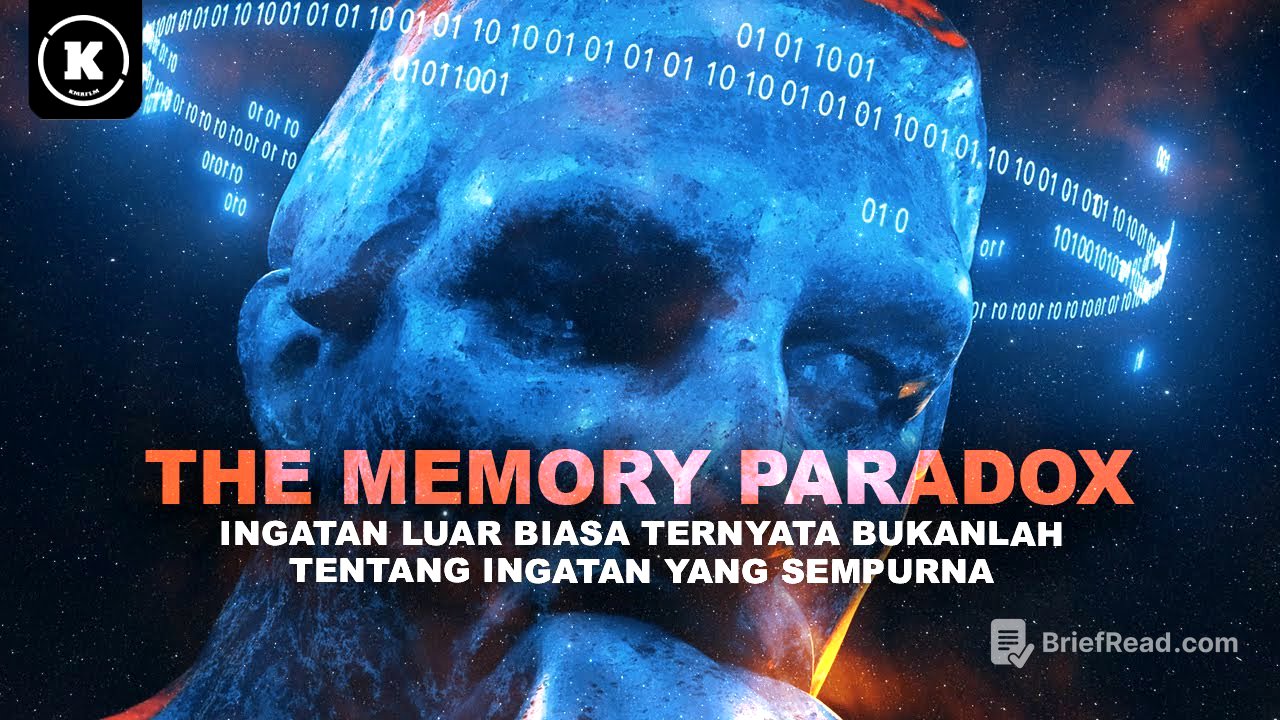TLDR;
This video explores the complexities of memory, contrasting it with the common perception of perfect recall. It begins with the extraordinary case of Solomon Shereshevsky, a man with seemingly limitless memory, and transitions into the fallibility of human memory, the phenomenon of false memories, and the impact of external factors like photography and social interaction on our recollections. The video also examines nostalgia, its benefits, and its potential dark side when used for political manipulation. Finally, it discusses the importance of forgetting as a necessary function for adapting, learning, and creatively reinterpreting the past.
- Human memory is fallible and susceptible to distortion.
- External factors like photography and social interaction can alter memories.
- Nostalgia can be both beneficial and harmful, especially when used politically.
- Forgetting is essential for learning, adaptation, and creative reinterpretation of the past.
The Mind of a Mnemonist: Solomon Shereshevsky [0:06]
In 1929, Solomon Shereshevsky, a reporter, was sent to see memory specialist Alexander Luria due to his remarkable ability to recall information without taking notes. Luria conducted tests, presenting Solomon with increasingly long sequences of numbers and words, which Solomon repeated flawlessly, even years later. Luria concluded that Solomon's memory capacity was virtually limitless. Solomon experienced an overabundance of detail with every word and thought. He struggled to forget unwanted memories, attempting to write them down or burn them, but without success. Some accounts suggest he became a taxi driver, using his memory for navigation, while others claim he suffered mental breakdown due to his inability to distinguish past from present. Luria's study revealed that Solomon's exceptional memory was intertwined with his vivid imagination and fantasy.
The Fallibility of Memory [4:14]
Human memory is not as reliable as we often believe. We use it for sharing stories, learning from the past, and creating our identities, but it is prone to inconsistencies. We often alter facts and add false details without realizing it. Research on memory interference shows that old memories can hinder the recall of new ones, and vice versa. This interference can lead to false memories, where we misremember events. False memories are common in recollections of childhood due to the incomplete development of the hippocampus, which affects how memories are recorded and recalled. External factors like suggestion, emotions, mood, and age can contribute to the formation of false memories. The only way to verify a memory is through authentic evidence.
The Impact of Photography on Memory [6:07]
While photos can help recall past events, they can also diminish our memory of what truly happened. Relying on photos leads to poorer recollection because our brains reduce non-visual sensations. For example, a photo of a vacation might overshadow the feelings, experiences, and sensory details of the event. Depending on photos to remember the past can distort our self-identity due to faded or blurred memories. This is because the act of taking a photo is often driven by a desire to show it to others. Our natural memory is not entirely accurate, leading to the creation of false memories through photos. False memories can also be a sign of brain disorders like Alzheimer's or dementia.
The Social Construction of Memory [8:27]
Memory is not an isolated activity. Like the game of telephone, memories can be altered each time they are recalled and shared. Small errors can occur due to our beliefs, expectations, or what others tell us about past events. These errors can have long-term effects on how we remember things. Our memories are not stored perfectly in a mental "library"; instead, they are constantly reshaped by social interactions. Others can implant memories, cause us to forget, or reinforce certain recollections. Every conversation is an invitation for someone to rewrite our autobiography. While this sounds alarming, there can be unexpected benefits.
The Paradox of Memory [10:50]
The harder someone tries to remember something, the more difficult it becomes to recall it. This paradox arises from the interaction between explicit and implicit memory. Explicit memory involves conscious recall of facts and events, while implicit memory relates to internalized knowledge and skills. Memory is not a solitary activity; we often rehearse and refine memories to share with others. When describing memories, we use artistic license, altering the story based on the audience. This "audience tuning effect" can change not only the message but also the memory itself. Recalling a memory can make it temporarily unstable, like taking ice cream out of the freezer, causing it to change shape when it is returned.
The Complexities of Nostalgia [13:31]
Nostalgia, initially described as a disease, is now understood as a bittersweet emotion, a longing for the past. It is not always about a specific homeland but can be a general yearning for lost people or childhood memories. Autobiographical nostalgia provides a sense of continuity and identity, offering examples of past situations to help manage current emotions. It also serves as a reference point when meeting new people and maintaining relationships. Culture influences how we remember the past; Western cultures focus on individual memories, while Eastern cultures emphasize social interactions.
The Dark Side of Nostalgia [16:31]
Nostalgia has a dark side. Svetlana Boym distinguishes between reflective and restorative nostalgia. Reflective nostalgia acknowledges change, while restorative nostalgia seeks to recreate an idealized past. Restorative nostalgia is often exploited by politicians who evoke a glorious past, sometimes with destructive consequences, such as Hitler's regime. This trend continues today with campaigns like "Make America Great Again" and the nostalgia for empire behind Brexit. Historical nostalgia aims to restore a golden era, often at the expense of marginalized groups. This nostalgia is fueled by the perception of national decline and is common among those who have experienced social disasters or those who benefit from unequal systems.
Anemoya: Nostalgia for a Time Never Experienced [18:44]
We can feel nostalgia for periods we have never lived through, a phenomenon called anemoya. Massabel Herman Gray notes that nostalgia softens the harsh edges of history and intensifies desirable moments. While nostalgia can help us cope with trauma, over-reliance on it can lead us to view problematic history as perfect. Nostalgia makes the past feel alive but it is, in fact, dead. The original "nostos" in Homer's Odyssey involved a painful return home, where Odysseus found his home plagued by suitors. His nostalgia was tainted by the reality he encountered. Nostalgia's suffering lies in the realization that the meaning of the past is not given but created.
The Blessing of Forgetting [20:46]
Forgetting is often seen as a defect, but it is a blessing and a necessary function of the human brain. Recent research suggests that forgetting is not a failure but a normal and essential process. It is a creative initiative that allows us to develop new perspectives. We cannot remember without forgetting, and we can only forget by remembering what we want to forget. Without forgetting, we would record everything like a computer, but unlike computers, human memory involves a process of forgetting that allows for reinterpretation.
Forgetting as an Active Process [22:34]
Scientists have found that forgetting is an active mechanism in the brain that promotes learning by allowing us to adapt to changing environments. Forgetting enables us to see the past in new ways, allowing us to creatively reinterpret it. Without forgetting, we could not meaningfully reinterpret the past. The brain's plasticity allows it to reorganize and form new connections based on experience, optimizing its function over time. Unlike computers, which operate on fixed algorithms, the human brain has remarkable flexibility and adaptability.









